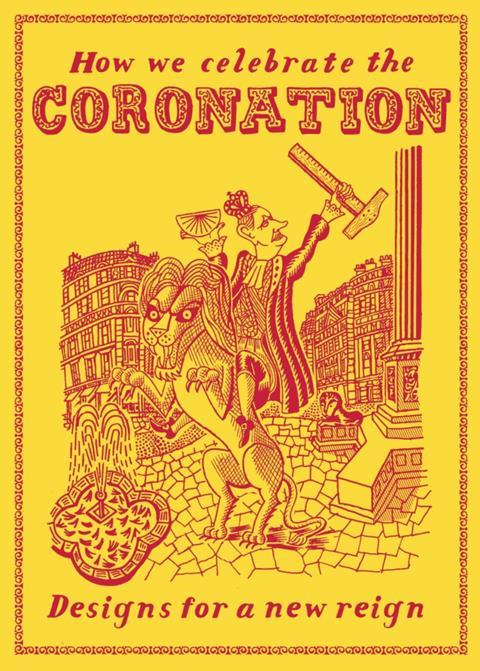Emma Dent Coad is at first intrigued and then dispirited by the Royal Fine Art Commission Trust’s publication

With its beautiful 1950’s styled cover and typography, I was enticed by the offer to review How we celebrate the Coronation: Designs for a new reign. It is edited by Stephen Bayley and Robert Bargery and published by the Royal Fine Art Commission Trust, of which Bayley is chairman and Bargery is executive director.
Its aim “to provoke debate and to spark action” was hopeful, so I was expecting something substantial. And it has a lofty ambition: “Some of its ideas, we hope, will please the King, capture the imagination of his people and prod his ministers into action.”
Given that Prince Charles is now King Charles and has committed not to meddle in politics any more, I was willing to put my reservations to one side.
The book comprises 55 short essays – some as short as 200 words, some a little longer. Hardly manifesto length, but it is depth not breadth that matters here. Some of the essays propose interesting and thought-provoking perspectives.
Simon Jenkins has some interesting perspectives, as ever
Terry Farrell shows his social conscience: “It is individuals who make the difference, not polices, and we need more leaders who truly care about the built environment.” Quite so; we also need built environment expertise in parliament, but it is scarce. A keen proponent of good planning, Farrell proposes “thinking ahead rather than reacting to events”, and says “planning can liberate us”.
Simon Jenkins has some interesting perspectives, as ever. He is especially astute on the siting of buildings, particularly large and tall buildings in urban settings: “Architects have lost the art of creating amenable public spaces… [but]… We should not only blame architects… the fault lies with the planners and local and national politicians who ignore the appeal of old buildings… If people will not talk, then money will, and bad buildings will result”.
Richard Best’s intro describes him as a “social housing expert”. He is a proper politician (albeit in the Lords) and is hugely knowledgeable. He also has some actual proposals for policy change to provide social housing which is desperately needed, saying “the time is right” for this.
My former profs Christopher Frayling and Dinah Casson, are both supporters of William Lethaby’s “town tidying”, though how we achieve that in London currently with 100 competing e-bike and e-scooter companies fighting it out on the streets and littering them with abandoned kit – for starters – is hard to say.
Sadly we aren’t Dutch or Danish, we have too many idiots driving fast cars quickly
Casson’s “call to local users to make local decisions… Local isn’t always best, or even tidiest, but it feels a lot better”, has the right tone for a local politician like me.
And I like Frayling’s comments on the Disneyfication of built heritage: “the whole country has been acquired as a theme park”. He also touches on the diminution of our history – a huge issue in my borough of Kensington and Chelsea, where among other aberrations wealthy incomers are turning modest Victorian homes into pseudo Palladian mansions.
George Ferguson has some positive proposals on designing the city around the needs of children – how lovely! First time I’ve heard of this as a concept. Sadly we aren’t Dutch or Danish and have too many idiots driving fast cars quickly. We need a lot of work on making fast driving anti-social before we reach peak road safety, but we do need to start that work.
Ian Ritchie’s observation that “the soul of our cities is at stake as we witness the privatization of urban spaces, a dystopian model of public disenfranchisement”, also rings true in densely built areas.
Just five of the 55 essays are written by women
So these and other essays are interesting. But of the 55 offerings some are just dire. We are facing crises of unimaginable seriousness, in so many sectors, affecting so many people. The idea that a polite request to the King – the man who perpetrated Poundbury on the world, gods help us – can or would make any difference at all is frankly delusional.
Just five of the 55 essays are written by women – don’t the editors know more than five women with informed and intelligent positions on the built environment? A vast majority are unconsciously London-centric. Some are literally passing thoughts - what I’d call “pub chat”, though given the insufferably trite and frankly snobbish comments on taste, I should probably say “champagne bar chat”.
The editors clearly have impressive contacts: many contributors are titled and honoured, and are referenced with all their nominals (a little vulgar I’d say). Despite the impressive line-up it’s disappointing that they have come up with a publication so fluffy and inconsequential, even embarrassing.
Improvement and change is possible. But without discussion on land value, on the never-ending and catastrophic cladding crisis which has devastated so many lives and futures, without discussion of supply line problems, construction quality, of workforce shortages and all the other issues facing the future of the built environment, it lacks depth and substance.
It is hardly offering anything innovative, inspirational, exciting or new. There is way too much nostalgia, and in the run-up to an insanely expensive Coronation with all the invented tradition we are supposed to respect, it is tone deaf.
Maybe architecture students should be made to read it, to understand the drab, male-dominated, self-referential world they are entering.
Perversely, this might inspire them.
>> Find the publication here
Postscript
How we celebrate the coronation: Designs for a new reign is edited by Stephen Bayley and Robert Bargery and published by the Royal Fine Art Commission Trust.
Emma Dent Coad is an architectural historian. She was the Labour MP for Kensington from 2017 to 2019 and has been a councillor in Kensington and Chelsea since 2006.
















1 Readers' comment